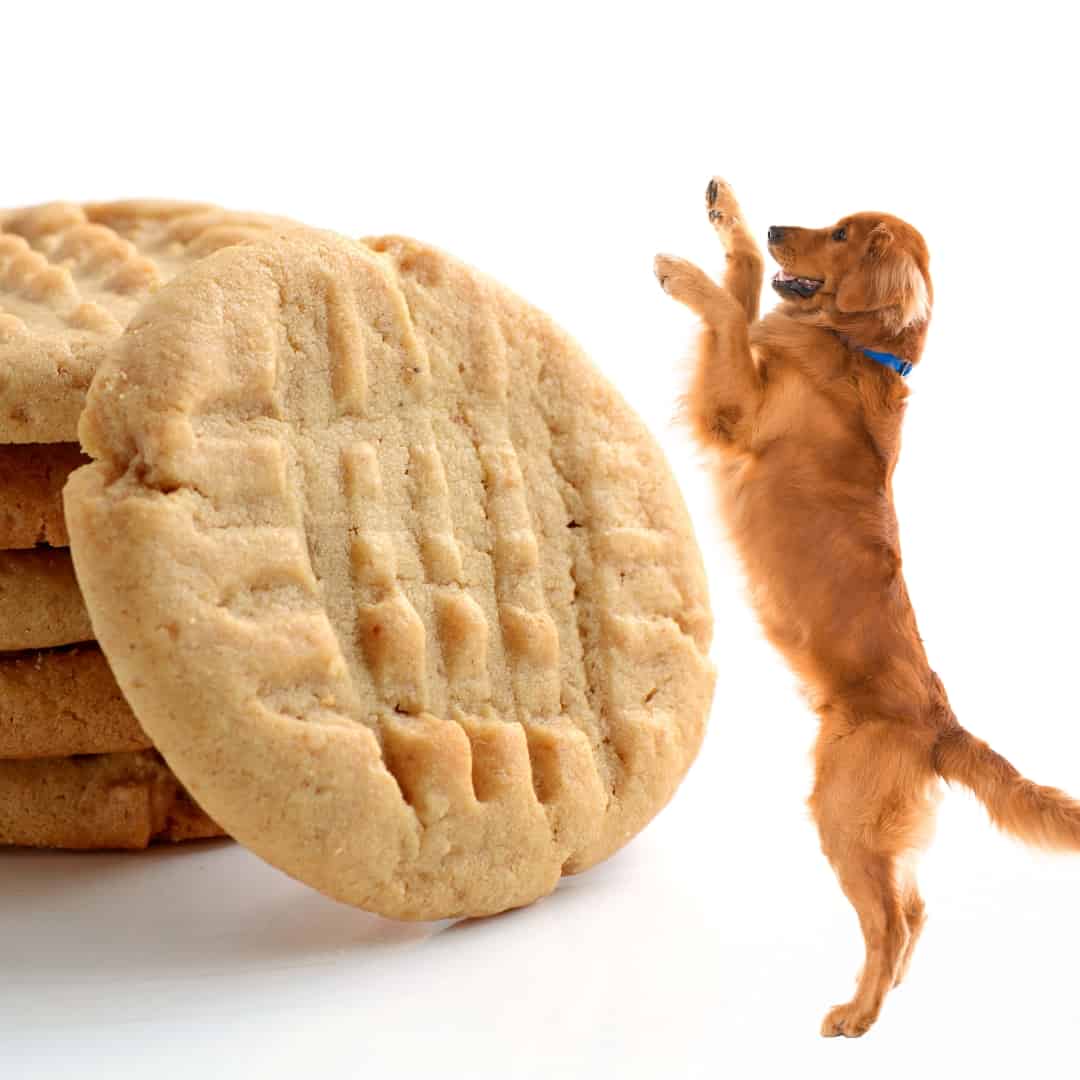Can Dogs Eat Peanut Butter Cookies?
Recipe Included
Dogs shouldn’t eat peanut butter cookies made for people. Sugar and wheat flour can worsen allergies, itching, obesity, diabetes and digestive problems. Peanuts can carry a toxin-producing fungus that contributes to chronic ear and skin infections in some dogs. The sweetener xylitol can be fatal to dogs.
Dogs love the taste of peanut butter, and most dogs are completely fine with a natural plain peanut butter treat in a kong toy, or to help them accept pills. But, when it comes to peanut butter cookies made for humans, the added ingredients can be harmful.
Can Peanut Butter Cookies Harm My Dog?
Plain peanut butter may be a safe treat most of the time, but once other ingredients are added to make peanut butter cookies, these treats become unhealthy for our furry friends. These include:
- wheat or enriched flour
- sugar
- xylitol
- chocolate
The Truth About Ingredients in Peanut Butter Cookies
Peanuts
Peanuts (or peanut butter) aren’t usually the very first ingredient in peanut butter cookies, but they’re exactly what makes them taste so delicious!
Here’s the good news! Peanuts are high in protein and fat -the two macronutrients that dogs thrive on.
The bad news is that peanuts can carry aflatoxin, a toxin produced by fungus and mold which can cause dogs to become very sick.
Aflatoxin
Aflatoxin is commonly found in many grains like peanuts, corn and wheat. Peanut meal can be used in animal feed and in one major incident of aflatoxin poisoning, 100,000 turkeys died from exposure to aflatoxin. This toxin can also grow on dry dog food products that contain these grains and has been responsible for numerous dry dog food recalls, illnesses and death.
Peanut butter manufacturers do take steps to reduce some of the toxin present in peanut products. A study by Swiller et al showed that 89% of the toxin may be reduced by roasting, blanching, grinding and adding sugar, salt and hydrogenated fats to peanuts during the manufacturing of peanut butter.
The bottom line is that high quality peanut butter is fine for most healthy dogs as a treat, but those with compromised immunity (including allergies, chronic infections or cancer) may be more vulnerable to the effect of potential toxins like fungus and mold.
Wheat or Enriched Flour
Wheat flour is at the top of the ingredient list in peanut butter cookies. Wheat is a high-carbohydrate grain that is not a necessary nor healthy source of nutrition for dogs. Despite this, wheat is often used as a cheap filler in dog food products and is making up 50% of some dry dog “foods”. Here’s the problem.
Dogs aren’t able to efficiently break down wheat gluten protein. Although their bodies are desperately trying to evolve, wheat gluten protein is causing microscopic lesions, immune reactions, gastrointestinal problems and inflammation throughout the body. When inflammation occurs in the ears, we see chronic ear infections with head shaking, rubbing, scratching and non-foul smelling ear wax.
Complex sugars like wheat-based carbohydrates also are the perfect food for yeast and bacteria to grow. So if your dog suffers from chronic itching, ear or skin infections, stop the wheat and get onto a whole foods protein, fat and vegetable diet.
Genetically Modified (GM)
Wheat is a highly genetically modified (GM) crop linked to several diseases in animals and humans. We are learning that genetically modified foods may be contributing to cellular damage and epidemics of poor digestion, allergies and chronic illnesses in both people and animals. There is early evidence through animal studies which indicates serious health risks associated with GM food, including:
- infertility
- immune reactions and allergies
- accelerated aging
- insulin regulation
- gastrointestinal bleeding
- liver, pancreas and kidney damage
Sugar
Sugar and glucose-fructose have no nutritional value for dogs. Sugar can contribute to diabetes and obesity, and can feed yeast and fungus that are common in chronic ear and skin infections.
Xylitol
Some manufacturers add this sweetener to sugar free baked goods and ice cream, toothpaste and sugar-free gum. It’s also added to some peanut and nut butter products and cookies (often marketed as keto-friendly). Xylitol can cause your dog’s blood sugar to drop within 10-60 minutes and lead to death. If your dog accidentally eats peanut butter or cookies containing xylitol, call your vet right away.
Chocolate
If you buy chocolate chip and peanut butter cookies, know that large amounts of chocolate can be toxic or even fatal to dogs. Don’t let your dog eat peanut butter cookies with chocolate.
Can I Give My Dog These Popular Brands of Peanut Butter Cookies?
Can Dogs Eat Nutter Butter Peanut Butter Cookies?
Although not fatal, don’t give your dog these cookies. Wheat flour can aggravate allergies and chronic health conditions, sugar and glucose-fructose have no nutritional value and can cause weight gain and worsen diabetes.
Can Dogs Eat Peanut Butter Girl Scout Cookies?
With or without the chocolate coating on these popular human treats, they aren’t healthy for your dog. Scout’s honour.
Can Dogs Eat Home Made Peanut Butter Cookies?
Although you have more control over the ingredients in home made cookies that you make for your family, stick with a dog-friendly recipe like the one below to avoid unnecessary ingredients.
How to Make Healthy Peanut Butter Cookies for Dogs
It’s no secret that dogs love the taste of peanut butter, and a high quality organic peanut butter cookie makes a great treat from time to time.
Organic Peanut Butter
Organic products avoid pesticides and the genetic manipulation often used to make crops more tolerant to deadly pesticides like Roundup.
Opt for grain-free organic ingredients and, if your dog suffers from yeasty ear or skin allergies that could be worsened with peanut butter, skip this recipe and try our peanut-butter free, grain-free recipe for dogs with allergies.
Grain-Free Peanut Butter Cookie Recipe for Dogs
Peanut Butter Cookie Recipe for Dogs
Ingredients
- 1/2 cup coconut flour
- 1/4 cup natural peanut or almond butter organic, no salt, no sugar, no xylitol
- 1 free range, organic egg
- 1 tbsp coconut oil, melted
Instructions
- Preheat oven to 300 degrees F
- Place coconut flour into a mixing bowl
- In a separate bowl, whisk together egg, oil and peanut butter
- Add wet ingredients to coconut flour and mix well
- Work the dough in your hands until it sticks together
- Divide evenly into 12-24 cookies (depends on the size of your dog) and place on cookie sheet lined with parchment (wax) paper
- Bake at 300 degrees for 40-50 minutes or until done
- Turn off oven and allow cookies to cool down while still inside (about 30 minutes)
- Remove cookies and allow to cool completely on a cookie rack
- Store in fridge or freezer
Notes
In a Nutshell: Your Most Common Peanut Butter Questions Answered
Can Dogs Eat Peanut Butter?

As long as the peanut butter does not contain xylitol, healthy dogs will be just fine with small amounts of natural peanut butter. Dogs with allergies, chronic yeast or fungal infections, compromised immune systems or food sensitivities are better off without peanut butter.
What Happens If a Dog Eats Peanut Butter?
For most dogs, plain natural peanut butter is a good source of protein and fat. In large amounts though, dogs may vomit or experience diarrhea due to the the high fat content. Always check the ingredients for xylitol – if your dog has eaten this toxic sweetener, call your vet right away.
If chronic infections worsen, stop feeding peanut butter and see your Holistic Vet.
Can Peanut Butter Make A Dog Sick?
In rare cases where a dog has a peanut allergy, or has food sensitivities, peanut butter can cause an allergic reaction or uncomfortable skin and digestive issues. Dogs on a low fat or low protein diet can experience a worsening of disease. If xylitol is an ingredient in peanut butter or peanut butter cookies, even a small amount can be fatal.
Can Dogs Have Peanut Allergies?
Dogs can have immediate anaphylactic reactions to peanuts, but this is rare. Food sensitivities are a bit more common. So if you notice signs of food sensitivities like increased itching, bald spots, excessive licking or stomach issues after giving peanut products to your dog, try eliminating peanuts altogether.
And if you’re still feeding your dog kibble, check with the manufacturer to see if peanut flour or meal is used, and check often for recall notices.
Can I Give My Dog Peanut Butter if Family Members Have A Peanut Allergy?
It is not recommended to give your dog any peanut products when a household member has a peanut allergy. Some people are extremely allergic and can react to airborne proteins. Be kind and don’t give dogs peanut products if taking your dog to a cafe, school, playground or other area where others with peanut allergies may be present.
Is it OK to Give My Dog Almond Butter?
Almond butter is a safe alternative to peanut butter, as long as there is no added sugar, xylitol, chocolate, preservatives or other ingredients. Substitute almond butter for peanut butter to help dogs accept pills, or to fill a kong toy. Try a bit of almond butter on an apple slice for a healthy treat.
Be kind to all living beings. Respect the earth we share.








